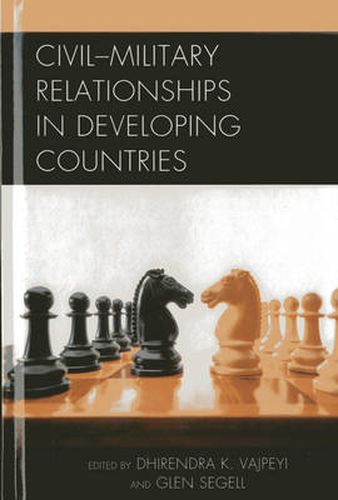Readings Newsletter
Become a Readings Member to make your shopping experience even easier.
Sign in or sign up for free!
You’re not far away from qualifying for FREE standard shipping within Australia
You’ve qualified for FREE standard shipping within Australia
The cart is loading…






This book examines two sides of civil-military relations in developing countries. One is the place of civil-military relations within a state’s political and economic systems; the other is the role of the military on a state’s maintenance of peace and stability. The book thus proposes that the function of soldiers is not only to defend and deter, but also to develop. The chapters provide a comprehensive analysis of civil-military relationship with comparative cases on Botswana, China, El Salvador, Honduras, Guatemala, India, Indonesia, Nicaragua, Nigeria, Pakistan, and The Arab Spring Countries of the Middle East including Bahrain, Sudan, Iraq, Jordan, Saudi Arabia, Egypt, Tunisia, Yemen and Libya. Each chapter analyzes the historical, cultural and political factors that shape the direction of the man on the white horse (military elite) and the politician. In doing so, this book reveals the potential impact of the nature of civil military relations on democratization, political and economic development, and on regional/international security.
Dhirendra Vajpeyi and Glen Segell discuss and critique the current models and literature on civil-military relations. The innovative framework and careful choice of case studies, presented in a jargon-free, accessible style, makes this book attractive to scholars and students of civil military relations and development studies, as well as policymakers.
$9.00 standard shipping within Australia
FREE standard shipping within Australia for orders over $100.00
Express & International shipping calculated at checkout
This book examines two sides of civil-military relations in developing countries. One is the place of civil-military relations within a state’s political and economic systems; the other is the role of the military on a state’s maintenance of peace and stability. The book thus proposes that the function of soldiers is not only to defend and deter, but also to develop. The chapters provide a comprehensive analysis of civil-military relationship with comparative cases on Botswana, China, El Salvador, Honduras, Guatemala, India, Indonesia, Nicaragua, Nigeria, Pakistan, and The Arab Spring Countries of the Middle East including Bahrain, Sudan, Iraq, Jordan, Saudi Arabia, Egypt, Tunisia, Yemen and Libya. Each chapter analyzes the historical, cultural and political factors that shape the direction of the man on the white horse (military elite) and the politician. In doing so, this book reveals the potential impact of the nature of civil military relations on democratization, political and economic development, and on regional/international security.
Dhirendra Vajpeyi and Glen Segell discuss and critique the current models and literature on civil-military relations. The innovative framework and careful choice of case studies, presented in a jargon-free, accessible style, makes this book attractive to scholars and students of civil military relations and development studies, as well as policymakers.